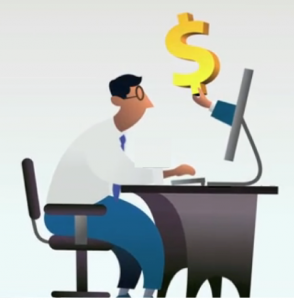What is Online Content Worth?
This is one of the most complex issues of our day. Everyone — from traditional newspaper, periodical, and book publishers to blogger moms — is trying to figure it out. So, too, is every individual consumer of digital content.
There are those who argue that if it’s online, it should be free. But why should it?
Is professional news gathering and analysis of less value because it’s shed its paper container? Certainly from a cost perspective online content may be produced for less. But is it rational to assert that it no longer has intrinsic value? That somehow the reader is entitled to it?
Great Content Has Value … But How to Value It?
And what about the blogger mom? Maybe she hasn’t built enough readership yet to command ad revenues. But is the experience she shares generously about parenting and/or products that make life easier for busy moms and dads up for grabs to be copied, pasted and posted?
Is her point of view and the time and effort she puts into crafting it without value?
This topic has heated up again recently as online ad revenues have begun to flatten and traditional newspaper publishers have begun to rally round the concept of charging readers. As discussed in a recent article last week in the New York Times, major papers around the globe are adopting so-called paywall and other models in their efforts to remain solvent in an increasingly digital age.
Publishing Changes, Technology Evolves
Since 1999 we’ve been helping large, well-known publishers and content creators protect their intellectual property online with automated methods for licensing and syndicating their digital content.
More recently, as content marketing has become increasingly popular, we’ve been making the same technology available to bloggers and other non-traditional publishers. These content creators share at least one important point of view: Great content has value.
It’s never easy to define exactly what a specific piece of content may be worth to a specific reader at any given time. But it is certainly always something north of zero. While great content might be free to read on the web, it need not be free for the taking.
New Opportunities For Those Who Adapt
The excitement and the opportunity of this transitional era lies in the flurry of experimentation as publishers of all kinds seek to find the models and the messages that establish content value.
The value of content from a time-honored brand like the New York Times may differ from small-town publications or citizen journalism, but all content has value when it teaches someone something they didn’t know or helps someone reach a goal or decision.
What Can We Do About It?
Ultimately, the individual content marketplaces will determine monetary value. But let’s at least all agree that content is valuable enough that we should, at minimum, respect the toils of the creators and the copyright laws that protect them.
Let’s make respecting content the norm, creating a rewarding experience for both author and reader the goal, and use the collective wisdom of the marketplace to establish the value.
